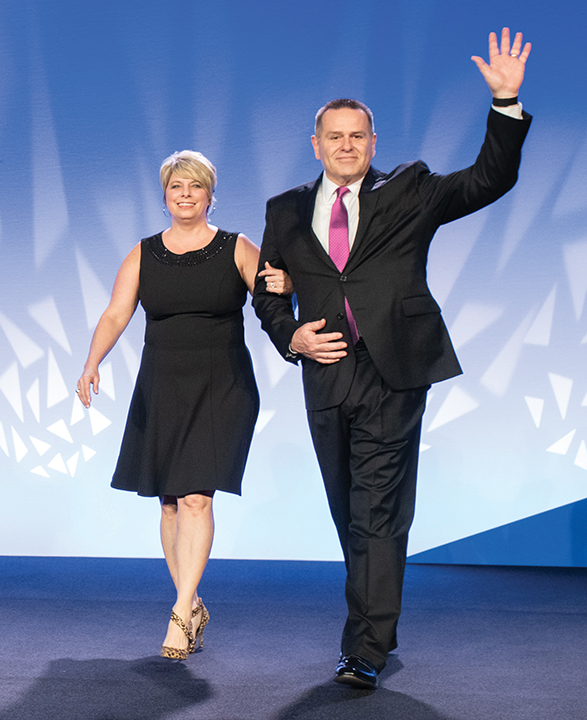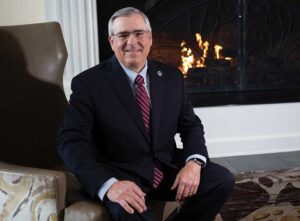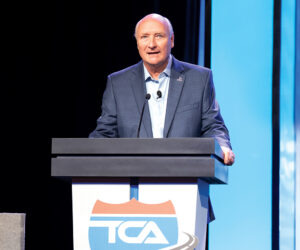Horse-racing enthusiasts can still hear the voice of Dave Johnson ringing in their ears.
For many years he called races for ABC and NBC Sports. Of great note is the fact that Johnson called the Kentucky Derby from 1978 to 1980 and 1987 to 2000, and the Preakness Stakes and Belmont Stakes from 1987 to 2000. Of great acclaim was his signature call as the horses came out of the final turn. “And down the stretch they come!” he would shout with gusto as viewers could begin to hear the hooves of the horses on the freshly turned turf. As we enter 2021, one could yell that same phrase as Truckload Carriers Association Chairman Dennis Dellinger enters the final stretch of his tenure leading the association. He has been at the helm of the organization through one of the most unusual years in history. In this issue’s Chat, the chairman talks about the association’s accomplishments during the past two months, shares what is on the agenda for the next three months, and talks about the rationale for rescheduling the annual convention from the Gaylord Opryland Resort in January to the Wynn Las Vegas Resort in April.
Mr. Chairman, thank you for joining us for another Chat with the Chairman. We hope you and your family had a Merry Christmas and Happy New Year. What are the traditions of the Dellinger family holiday celebrations?
I have mentioned several times in the past that I am part of a large family. This year, COVID-19 has brought change to some of our past Christmas traditions, but we know it is temporary. We normally attend Christmas Eve candlelight services at church and gather with family on Christmas morning. The long-standing tradition begins with a morning breakfast followed by a late dinner. Absent COVID-19, this dinner might include up to 45 people. I did say my family was large!

Speaking of Christmas, TCA recently participated in events surrounding the transporting of the U.S. Capitol Christmas Tree to Washington. Why is it important for the association to participate in this event?
Trucking plays a critical role in transporting “The People’s Tree” each year and it’s imperative that TCA bring recognition to the transportation aspect of the program. We have been a longtime supporter dating back to 2012 when TCA began its relationship with Choose Outdoors, the nonprofit which organizes the initiative. I was excited when TCA asked Cargo Transporters to co-host a whistle stop in my home state, and what better place than Asheville, North Carolina, to host the tree? The event featured a photo booth, food trucks, local media, and a special appearance by Santa Claus. More than 500 people had the opportunity to see this piece of history as it made its only stop outside of Colorado, where the tree was harvested, while en route to the West Lawn of the U.S. Capitol.
Despite the holidays, the pace has not slowed at TCA. One of the most visible events was the Fourth Annual Bridging Border Barriers, which attracted a record attendance as a virtual event. What were the highlights of this meeting?
TCA conceived of this event to bring networking, content, and educational opportunities north of the border. Though I was disappointed I was unable to make the trip to Canada, I was excited there were over 500 registrants for the virtual event in early November, further substantiating the relevance of TCA to the industry. This event continues to grow much as it was envisioned, clearly getting a boost from the virtual platform this year. Highlights included a great human resources panel focusing on employee engagement and retention efforts north of the border. Dave Heller provided an update on regulatory issues, the Canadian electronic logging device mandate, and the prospects of an infrastructure bill in the U.S. under a Biden presidency. Finally, it is always great to see the relationship between TCA and the Canadian Trucking Alliance on display as John Lyboldt, Stephen Laskowski, and Mark Seymour of Kriska Transportation Group covered cross-border operations in today’s environment. Overall, the event was a huge success, and we look forward to convening live and in person next year.
What are some of the association’s other accomplishments since we last spoke?
In the two months since we last spoke, the association continues to be extremely busy. It is quite easy to get caught up in all things COVID-19 and forget there are still things that have occurred within the association. In an effort to provide our members the safest environment possible, we have transitioned our Annual Convention, Truckload 2021, from Nashville in January to Las Vegas in April, allowing us a larger venue if social distancing is still required. This decision has been viewed as a positive step from a membership that is both anxious and eager to engage in the networking opportunities that in-person meetings allow. Besides the venue change, TCA hosted the Bridging Borders Barriers event and a whistle stop for the Capitol Christmas Tree as just alluded. Our educational offerings, i.e., webinars, continue to see larger-than-normal attendance numbers, which complement the educational department’s increased online learning enrollments. Also, as we prepare for the new administration in January, the government affairs team is reviewing its strategic agenda in preparation for ongoing meetings with the transition team. I assure you, it is TCA’s desire to get behind a meaningful discussion to ensure an infrastructure package is passed early next year.
As you head into the last months of your chairmanship, what is on your agenda for continuing to advance the value of the association to its members?
I have talked several times about TCA being the best proposition value our industry has to offer. In a membership survey distributed this fall, I was excited to see confirmation of the same. Your responses are important to the leadership of the association as we continue to chart a strategic pathway for the future of the association. The staff is serious about reviewing all responses and ensuring the best services are provided to the membership. In addition, they will be considering requested programs and will work to enhance or better communicate those programs that exist today. Finally, many readers may not be aware, but for the sake of continuity and consistency at TCA, Jim Ward and I will meet in late January to discuss the transition of unfinished business, as was done with me prior to chairing TCA.
Your chairmanship has been extended a few weeks with the decision to make the annual convention an in-person event and move it to Las Vegas in mid-April. What was the rationale behind this decision and what is the association doing to ensure the safety of the delegates?
The decision was given much careful thought in the months prior to the announcement. Since COVID-19 became an issue, the leadership discussed each scheduled meeting, citing the pros and cons surrounding the safety of each venue related to our membership, and whether we should be in person or virtual. We knew in late October the January meeting posed risks from a venue standpoint, as well as a timing issue related to COVID-19. The staff began to explore options to push the meeting back and possibly find a bigger venue that could accommodate our membership should social distancing still be required. We followed up with the membership with the option of Las Vegas in mid-April only to find there was overwhelming support for an in-person meeting. I look forward to passing the baton to Jim Ward in person at the Wynn in Las Vegas.
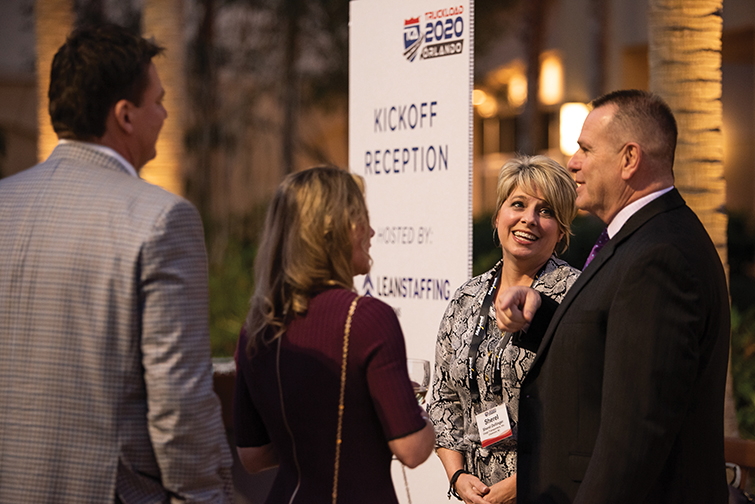
What are some of the highlights of the convention schedule?
Truckload 2021 in Las Vegas is going to be a fantastic event. Seeing how we convened our convention last year just as the pandemic was starting, it looks like we will reconvene at an opportune time as well. The membership has told us they are eager for the opportunity to see one another and get back to business as usual. What we may have taken for granted in the past will definitely be my greatest highlight, and that is networking with as many as 1,200 attendees and exhibitors. While virtual meetings have proven successful, to have over 100 exhibitors on the exhibit floor and qualified speakers participating in as many as 25 educational sessions will be a welcome return to in-person meetings. The “Trucking in the Round” sessions pertaining to leadership, human resources, safety, and profitability allow choices for every attendee to participate. I’d be remised not to mention, we have two great keynote speakers, Mr. Daymond John and Mr. Jim Kwik. I look forward to their messages and to seeing each of you once again in a face-to-face environment.
Voters have spoken and the Trump administration will end on January 20. Donald Trump seemed to be a strong supporter of trucking, highlighting the industry at some White House events. However, Trump was not able to advance an infrastructure plan as he wanted. Why was he not successful?
I want to tread lightly on this response, but will chalk it up to timing and leadership. Trump was looking for a legislative win and was successful with the Tax Cuts and Jobs Act of 2017, which was popular with the Republican-led House and Senate. Though both sides said they wanted an infrastructure plan, the same Republican-led House and Senate struggled to agree on the means to pay for the massive program. By the time infrastructure was revisited, divisions in party lines became greater, only to be followed by a sweeping change in the make-up of the House and its leadership. As Trump was ensnarled in continuous battles with the Democratic opposition, opportunities for bipartisan legislation — whether it was infrastructure or any other matter — seemed improbable if not virtually impossible.
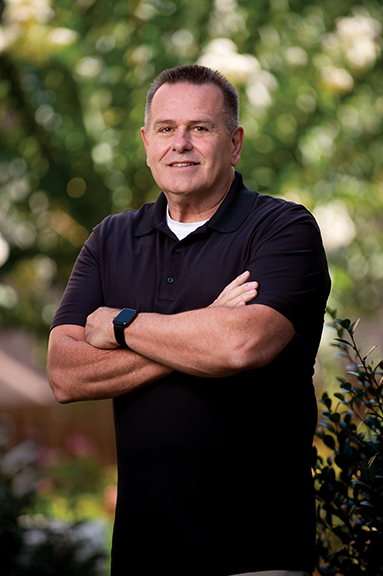
President-elect Joe Biden recently released his own plan to “revitalize America’s infrastructure with unprecedented investments” to make America more competitive with the rest of the world. What are the key elements of him being successful?
The obvious is to learn from history as to why the previous administration failed. I think the Biden administration will have an aggressive agenda that includes infrastructure. On the other hand, passage of a funding mechanism may be somewhat difficult should the Republicans hold the majority in the Senate. As I stated earlier, both sides say they want an infrastructure plan but differ greatly as to how to accomplish the same. Maybe the Biden administration will be better reaching across the aisle, should it be necessary. For the sake of our industry and the U.S. economy, this is definitely an item that I will continue to watch and advocate until a bill is passed.
The Drug and Alcohol Clearinghouse has been operational for one year. What do you hear from the membership about how the Clearinghouse has benefited them in their recruitment process?
Since its inception, the Drug and Alcohol Clearinghouse has removed nearly 30,000 drivers from our industry. That alone speaks volume of the benefits afforded through the program. As for recruiting, it is priceless to access one source to gain a better understanding of an individual seeking employment instead of relying on substandard information, or even no information, as was prevalent in the past. As a carrier that uses hair testing, I can also say the Clearinghouse is not being fully utilized. Hair testing has been successful in detecting a large number of offenders by viewing a longer history of drug use than the federally regulated urine testing we are now required to use in our industry. Until the Clearinghouse allows reporting of alternative methods like hair testing, the data will not be as accurate as we know it to be.
The nation is well aware of the way the trucking industry and its drivers have stepped to the forefront during the COVID-19 pandemic, moving critical cargo throughout the country — often without regard to personal safety. with The approval of the Pfizer vaccine and probable approval of others, do you expect the industry to play a pivotal role in distribution of this important medicine?
As we have seen in the news, the trucking industry has already started playing a pivotal role with the distribution of the Pfizer product. As you know, our industry is the most flexible form of freight transportation in the U.S. This is demonstrated by the mere fact there likely is not a thing you own that has not been on a truck, whether a finished product or the raw materials used to construct the same. Trucking has already played a role in the development of these vaccines by delivering the raw materials to pharmaceutical companies and as more vaccines roll out, the industry can offer flexibility and timeliness that other modes could not. Will there be challenges? Certainly, but overcoming challenges is what we do best as an industry. The Federal Motor Carrier Safety Administration (FMCSA) has already granted an exemption to the hours-of-service regulations for those carriers and drivers transporting the vaccine and corresponding supplies. If it needs to be hauled, our industry has demonstrated it has and will continue to serve at the front lines of the COVID-19 battle.
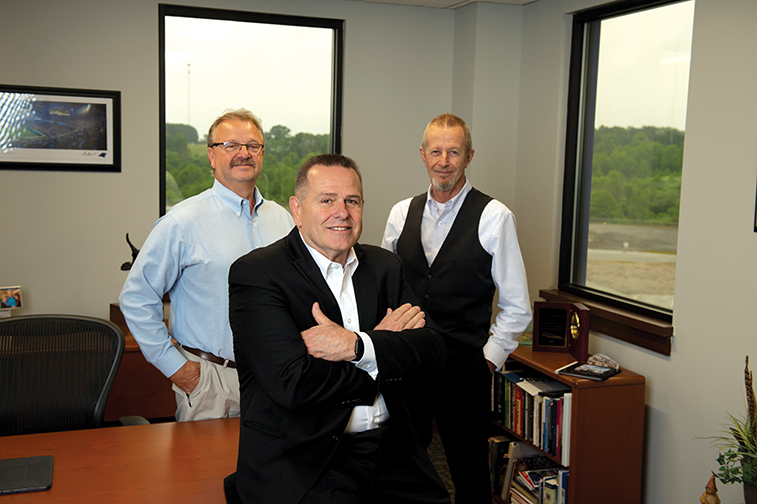
Speaking of drivers, the past few issues of Truckload Authority have featured stories of the heroic efforts of drivers who’ve earned wings as Highway Angels. What is the importance of the Highway Angel program, and why should members nominate drivers for this honor?
The Highway Angels program began in 1997, and I am proud to say it has recognized nearly 1,300 professional drivers to date. I’m always inspired to hear the stories of these highway angels and the gratitude of those they assisted. In April 2020, TCA rolled out a microsite, making it easier to read not only the details of their heroic stories but to see pictures and possibly hear recorded interviews. We all know that recognition programs help promote satisfaction among employees. Recognizing our drivers for going above and beyond to help those in need is important because those actions are not just another part of their job. TCA and its Highway Angels sponsors are there to assist us and give us the platform to give the proper recognition warranted.
In closing, share with members any thoughts you have about trucking in 2021.
I am very optimistic about 2021. The rollout of a vaccine for COVID-19 could jumpstart both the U.S. and global economies, and should the new administration focus, as previously mentioned, on an infrastructure package, our industry would definitely see long-term benefits as well. Our opportunities in 2021 will focus on the age-old problem that once again ranked in the Top 10 trucking industry concerns according to the annual report by the American Transportation Research Institute, which is the driver shortage. It will be important that we continue to make our industry more attractive to women and minorities. Our industry will see and hear more on this issue, and what better time than 2021 to press forward?
Thank you, Mr. Chairman.
Lyndon Finney’s publishing career spans over 55 years beginning with a reporter position with the Southwest Times Record in Fort Smith, Arkansas, in 1965. Since then he’s been a newspaper editor at the Southwest Times Record, served five years as assistant managing editor of the Arkansas Democrat-Gazette in Little Rock and from November 2004 through December 2019 served as editor of The Trucker. Between newspaper jobs he spent 14 years as director of communications at Baptist Health, Arkansas’ largest healthcare system. In addition to his publishing career he served for 46 years as organist at Little Rock’s largest Baptist church.

